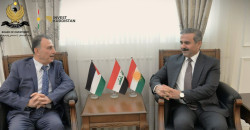Iraq’s public sector workforce set to shrink, private sector to take lead in a decade

Shafaq News/ Iraq’s public sector workforce is expected to account for
just 1-2% of the private sector in the next decade, an advisor to Prime
Minister Mohammed Shia Al-Sudani said, amid a surge in government hiring in
recent years.
“We have reached sufficient staffing levels after hiring extensively
over the past years. Under current conditions, public sector jobs will only
make up 1-2% of the private sector in 10 years,” the advisor noted.
Al-Sudani, in a statement on Saturday, stressed Iraq’s need to diversify
its economy and reduce reliance on volatile oil revenues, which remain the
primary source of the country’s financial resources. He warned that the state
could no longer sustain continued public sector hiring.
“The policy of government employment cannot continue,” al-Sudani said
earlier, urging a shift in focus towards other economic drivers.
Economists have echoed the need for reforms, calling for greater support
for the private sector to stimulate job creation. “Strengthening the private
sector is critical to reducing reliance on government jobs,” one economist
said, adding that Iraq’s banking sector must play a key role in financing private
enterprises and fostering economic growth. Some called for involving the
private sector in key economic decision-making as part of efforts to revitalize
Iraq’s economy.
Limits Of Public Sector
Hussein Falamarz, head of the Entrepreneurship Team and advisor to Iraqi
premier, said that public sector employment has reached its limits, following
significant hiring in recent years. Falamarz said that future government
employment would focus primarily on key sectors such as education and
healthcare, where the state remains responsible for infrastructure and budget
allocations.
“The public sector, which is government employment, has boundaries,”
Falamarz told Shafaq News Agency. “With the large number of people hired in
recent and current periods, there is now sufficient staffing. Future hiring
will depend on the government’s expansion plans in education, healthcare, and
essential sectors where the government continues to manage infrastructure or
provide funding.”
Falamarz explained that this situation will lead to a decline in public
sector hiring as private sector employment rises. “Foreign investment companies
are coming in, and they need small projects, which are provided by the local
community. This is why the state has begun focusing on vocational training
centers,” he said.
He assured that the private sector can accommodate everyone, as it
creates job opportunities based on real market needs. “Any individual who
creates a job for themselves in the private sector simultaneously provides job
opportunities for others. The private sector always grows based on genuine
local demand, unlike the public sector, where certain departments may not have
a significant impact but are necessary. In the private sector, there is no job
creation without actual demand.”
Falamarz projected that Iraq’s rapidly growing population, which
increases by over a million people annually, underscores the need to boost the
private sector. “This demographic growth requires the promotion of the private
sector, along with harnessing all available resources and establishing
partnerships between the government and private enterprises, such as through
the Iraqi Development Fund and the Entrepreneurship Initiative.”
He explained that the goal is to build a private sector that meets
national needs while providing job opportunities for youth across all skill
levels.
“The Entrepreneurship Initiative, launched by the Prime Minister on
March 4, 2023, aims to encourage the private sector and motivate young people
to enter the labor market according to their skills. It also seeks to study the
labor market through them,” Falamarz said. “Research has shown that small
projects are the best way to secure employment. With the training,
registration, and app-based tools provided by the Entrepreneurship Initiative,
it has become easier for all trainees, especially the youth, to access job
opportunities.”
Government Support
Iraq’s constitution mandates government support for the private sector
to play a central role in driving economic growth and creating jobs, said Samir
Al-Nasiri, advisor to the Association of Iraqi Private Banks.
“Article 25 of the Iraqi Constitution emphasizes the need for the
government to support and develop the private sector, allowing it to take on a
key role in development and job creation,” al-Nasiri told Shafaq News Agency.
He noted that government hiring in 2023 and 2024 had exceeded its capacity,
making private sector support essential.
“Supporting the private sector is necessary for generating jobs, and the
banking sector must play a major role in financing small, medium, and large
private projects,” he said, adding that the private sector should also
participate in key economic decision-making.
He pointed to the importance of including private sector representatives
in central committees tied to the Prime Minister’s Office, such as the
Ministerial Council for Economy and the Economic and Financial Reform Cell.
“This involvement is necessary to discuss critical economic decisions that
support sustainable development,” Al-Nasiri said.
With sufficient support, the private sector can provide jobs for
graduates and unemployed workers across sectors, including industry,
agriculture, tourism, services, health, and real estate, he explained.
"The private sector must play a fundamental role, as outlined in
the Private Sector Development Strategy for 2014-2030 and the National
Development Plan for 2024-2028."
Decades Of Negligence
“The private sector is neglected and
struggling. For example, the number of projects in the egg and poultry
production sector has dropped from 6,000 to 2,000, and of those, only 1,000
remain. The other 1,000 are also on the verge of closure due to negligence and
the lack of border control and supportive policies,” Lawmaker Ibtisam al-Hilali
told Shafaq News Agency.
The lawmaker added that the parliamentary agriculture committee has
passed Law 35, which is now up for a vote in the House of Representatives. “This
law is important, as it grants farmers the right to establish projects such as
feed and poultry factories, which will contribute to job creation and boost
agricultural production,” she said.
Meanwhile, economic expert Mustafa al-Faraj criticized the government's
efforts to reduce unemployment and employ Iraqi labor, calling them
insufficient given the scale of the problem. "Government measures to
reduce unemployment and recruit Iraqi workers have been ineffective and do not
match the magnitude of the current crisis, where unemployment stands at around
35%, a figure likely to rise with the freeze on public sector hiring,"
al-Faraj said.
He emphasized the need for the government to turn to the private sector
as a "true partner" and encourage it to employ Iraqi workers. “The
private sector is being undermined by the government, with no support in the
face of stifling bureaucracy and red tape, which has caused its decline and
exacerbated unemployment in Iraq,” he said.
Al-Faraj revealed that Iraq is home to roughly one million foreign
workers, with 30% to 50% of them having entered the country illegally. “These
foreign workers are competing with Iraqi labor, draining local workers’
opportunities. Reducing the number of foreign workers would open up job opportunities
for Iraqis, especially given that there are 1.5 million unemployed Iraqis,” he
noted.
He urged Iraq's Ministry of Labor and Social Affairs to hold workshops
to train Iraqi workers and prepare them for the job market while safeguarding
their rights. Al-Faraj also called on Iraq's Ministry of Higher Education and
universities to update curricula to align with labor market demands,
particularly as technology and artificial intelligence continue to evolve.





